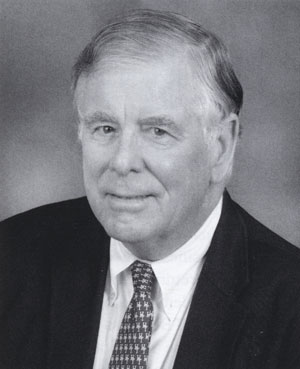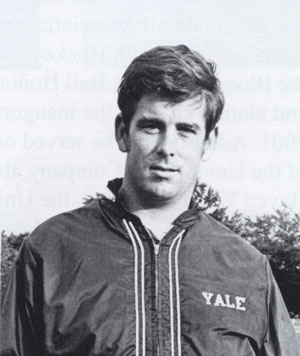Class News
Chris Getman receives Yale's Lifetime of Leadership Award

Chris was one of 6 recipients of the Lifetime of Leadership Award, awarded at Yale University Athletics' Blue Leadership Ball on Nov. 18, 2011. Chris's citation read as follows:
"Chris Getman has served his alma mater and the New Haven community in a variety of capacities. He returned to the Elm City six years after graduation to serve as Assistant Director of the Alumni Fund and Assistant Coach for the freshman football and varsity baseball teams. Since then, he has been a President of the Yale Baseball Association, an Alumni Chair of the Blue Leadership Ball, and a recipient of the Yale Medal. However, his most prominent role may be as the keeper of Handsome Dan, Yale's beloved mascot, for 25 years.
"In 1971, Getman joined White Weld & Co., which eventually merged with Merrill Lynch. At Merrill Lynch, he served as a first vice president and was elected to the initial Circle of Excellence. After 30 years as a financial advisor, he became the President of Soundview Capital Management Corp., based in New Haven.
"Getman has been very active the New Haven community serving as president of the New Haven Symphony Orchestra, the Mory's Association, and the Alexis de Tocqueville division of the United Way of Greater New Haven. For his incredible service, he was awarded the Elm Award from the mayor and president of Yale, the Mory's Cup, and the Alexis de Tocqueville Society's 'Touch a Life' Award."
Chris delivered a strongly worded acceptance speech, received well by the large audience of present and former Yale athletes and other guests. Watch Chris's speech here.
Here is the text of the speech.
"Thank you.
"It's an incredible privilege for me to be honored along with the 33 other outstanding and more qualified men and women who have received this award.

"I came to Yale as a hard throwing left-handed pitcher, who, in the pre-draft era had had conversations with eight of the then sixteen major league teams. I was the opening day pitcher against Camp Lejeune as a sophomore, even though I had not played as a freshman.
"However, control, or lack of it, soon came to haunt me. A scout from the Pirates said: 'He's got major league heat, but he's not too quick with the compass.' My teammate Bob Kelly, a good college pitcher, said: 'he could throw a ball through a wall if he could find a wall big enough to hit.'
"After making a great shot to the fourth green at Yale, I saw Ken MacKenzie, the former major leaguer and Yale coach, who was on the third tee, and yelled, 'Hey MacKenzie, did you see that shot?' Without missing a beat he yelled back, 'I know you didn't throw it, because it's on the green.'
"Like many of you, if I were in the audience armed with a tomato to drive a boring speaker from the podium, it would probably go high and outside.
"I was truly a major league prospect… from the neck down.
"It wasn't until we were playing Wesleyan, and I had given up what was arguably the longest home-run ball ever thrown by a Yale pitcher and then almost had my head ripped off by a liner back through the box, that I had an epiphany. Coach Ethan Allen came to the mound and saw the look of pure terror on my face. 'I think you'd better take me out,' I mumbled. He glared at me and responded 'You want to come out?' to which I timidly nodded. Ethan sat me down for two weeks, remarking that he didn't want a quitter on his team.
"Having the courage not to quit was an important life lesson which I learned then and which has stuck with me ever since. It's more readily learned on the athletic field than in the classroom and is one of the reasons why I'm here.
"Developing courage is only one of the many positive but unquantifiable benefits derived from playing a sport. Sacrifice, teamwork, self-discipline, both mental and physical strength, and of course leadership are also admirable qualities.
"So is representing a fine university.
"That's why I'm disappointed that Yale's announced admissions policy will more than likely relegate our teams in the future to an unlevel playing field in the Ivy League, whose standards are the highest of any league in the nation. The allowed quota of recruited athletes is a formula reached by the Ivy presidents and athletic directors, wise men and women who understand the value, both mental and physical, of organized competition. Hence, it's disheartening to me that while we have what is arguably the finest athletic venue in the country — just look at this beautiful space — the University has openly decided to take far fewer of the recruited athletes than allowed, while the rest of the Ivy League has elected to remain at or near full capacity. I believe that this policy undoubtedly will hurt us in the future.
"In my view we should strive to be the best at everything we do, and this seems eminently possible given the overall quality of the Yale experience. Yale has the highest scholar/athlete academic ranking of any university in the country, so clearly our players are not discrediting our academic distinction. In addition, they bring great credit to Yale, particularly when they're allowed to be successful. To expect our committed scholar athletes and coaches to compete with a recruiting disadvantage is not consistent with Yale's image or mission to be excellent. While we may be doing well now, I'm not optimistic about the future.
"There is ample evidence that successful, uncorrupt athletic programs beget strong overall student bodies. Duke, Stanford, and Vanderbilt, among many others, are good examples of this. The pride engendered by successful teams is contagious. Consequently, it doesn't surprise me that Princeton, with by far the most Ivy Championships, also has the highest percentage of alumni giving in the league.
"I don't like being worse than Princeton in anything, be it biology or baseball, science or swimming, French or football. The same goes for Harvard.
"Ingalls Rink was virtually sold out for the entire season last year because the men's hockey team was so good, and there were the most people in New Haven in over 20 years when we played Harvard for the Ivy football title in 2007. The Princeton-Harvard basketball title playoff, played here last year., was sold out, and this year we've sold more season tickets for men's hockey than any time in history. There's a reason for this and it's good for Yale.
"Furthermore, it makes perfect sense.
"I recently received the Yale Daily's freshman edition. It's a comprehensive magazine designed to inform incoming freshmen about life at Yale. I was struck by the fact that while there were extensive articles about social policies and protocol at Yale, there was no mention of what is arguably the finest intramural athletic program in the nation, which is a core part of the undergraduate experience. Furthermore, there seems to be a dichotomy in the undergraduate body, consisting of the athletes and the 'normies.' All Yale undergraduates are extraordinary people, each in his or her own way. They all can learn from each other. That's why I'd suggest that all coaches, especially coaches Williams and Allain, encourage their players not to move off campus. The current de facto 'athletics dorms,' in my opinion, rob both athletes and the 'normies' from benefitting from the complete Yale experience. More interaction would solve this problem quickly.
"When I look at the names of the undergraduates carved in Woolsey Hall, I know that every man, from the first two world wars to Korea and Vietnam, including four classmates, had to pass a physical exam before he could graduate. The notion of having a sound mind as well as a sound body, along with the self-discipline required to achieve such, I'm sure, served these brave men well. In my view, not having a physical requirement deprives one of a valuable educational asset. Just knowing how to swim is an important life lesson.
"In his highly acclaimed book, Brothers, Rivals, Victors, Jonathan Jordan attributes special significance to the fact that Generals Eisenhower, Bradley and Patton all played sports, and he implies that doing so enhanced their qualities as leaders.
"The first recommendation of the Jones Commission on Athletics, presented to the Corporation in 1976, states: 'Athletics require the same quality of administration and the same attention as every other segment of the University. The President of the University must establish that he [their words, not mine] will not tolerate mediocrity in the athletic department any more than he would tolerate mediocrity in any other areas of Yale activity.' I hope that this recommendation, rendered with strong bi-partisan thought and wisdom, has not been recently repudiated.
"Most of us who have done so would argue that playing on a team, as President Bush has just stated so eloquently, is a life enhancing experience. The value of the athletic experience is wonderfully summed up by the legendary Dean Clarence Mendell who wrote: 'In competitive sport, judgment under stress, quick thinking, self-confidence against odds, cooperative action, sportsmanlike respect for the rights of the other man and for the rules of the game — all these are tested under expert observation. The competitions of life are different and often more severe, but in the laboratory of sport, the evidence is clear and the lessons are lasting.'
"Again to quote President Bush, representing Yale, while experiencing the benefits of playing on a team, is an enormous privilege. I have never met anyone who wasn't proud to have worn a Yale uniform, and I look forward to the time when one of the greatest programs in our nation's history is restored to its former glory. Maintaining parity with the rest of the League would be an easy step in this direction.
"Tom Beckett's goal of our being 'the best of the best' is an admirable and attainable goal, and it coincides with Yale's commitment to excellence. It's a goal to which we should aspire.
"Thank you again. I'm deeply honored.
"Good luck tomorrow. Beat Harvard! Let's ruin their season! And go to Mory's after the game!"

